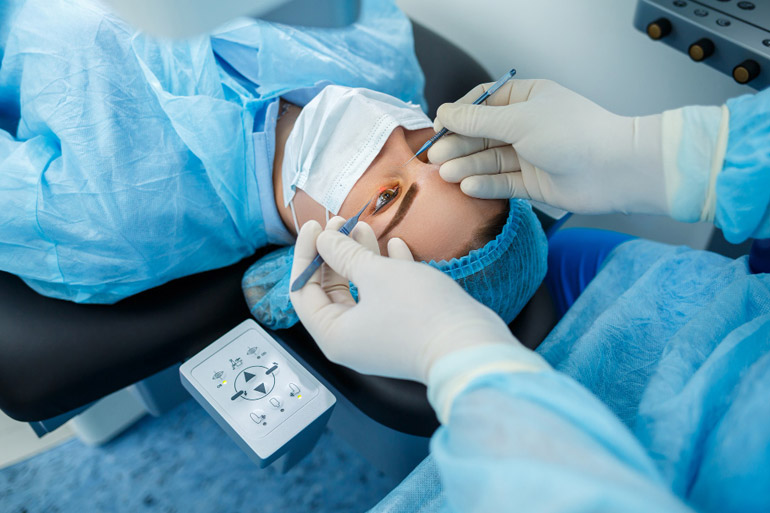Cataract Surgery: What to Expect Before, During, and Afterwards

Welcome to our comprehensive guide on cataract surgery from the No. 1 eye hospital in Kerala. Cataracts are a common condition that can significantly impair vision, but with modern medical advancements, eye cataract surgery has become a safe and effective treatment. In this blog, we’ll walk you through what to expect before, during, and after the cataract surgery procedure and discuss the various types of cataract surgery and available cataract treatment options.
Understanding Cataracts
Cataracts occur when the eye’s natural lens becomes cloudy, leading to blurred vision and if left untreated, eventual blindness. They are typically age-related but can also result from injury, certain medications, or medical conditions such as diabetes.
Before the Surgery
Eye cataract surgery preparation involves several steps to ensure the best possible outcome. Here’s what you can expect:
- Initial Consultation: Your journey begins with a comprehensive eye examination at our hospital. Our ophthalmologist will assess the extent of the cataract and discuss your medical history.
- Pre-Surgery Tests: We may conduct additional tests to measure the shape and size of your eye, which helps in selecting the appropriate lens implant.
- Discussion of Options: There are different types of cataract surgery and lens implants available. Our specialists will explain these options, including the benefits and risks, to help you make an informed decision.
Types of Cataract Surgery
There are primarily two types of cataract surgery:
- Phacoemulsification: This is the most common method, where an ultrasound device breaks up the cloudy lens into small pieces, which are then removed. A clear artificial lens (intraocular lens, or IOL) is implanted in its place.
- Extracapsular Cataract Extraction: In cases where the cataract is too dense for phacoemulsification, a larger incision is made to remove the cloudy lens in one piece before inserting the IOL.
During the Cataract Surgery Procedure
The cataract surgery procedure is typically performed on an outpatient basis and takes about 15-30 minutes per eye. Here’s what happens:
- Anesthesia: Local anesthesia is administered to numb the eye, and a sedative may be given to help you relax.
- Incision: A small incision is made at the edge of the cornea.
- Lens Removal: The clouded lens is removed using the chosen method.
- IOL Implantation: The artificial lens is inserted to replace the natural lens.
- Closure: The incision is either self-sealing or may be closed with tiny stitches.
After the Surgery
Post-surgery care is crucial for a smooth recovery and optimal results. Here’s what to expect after the cataract surgery procedure:
- Immediate Recovery: You will spend a short time in the recovery area before going home. It’s important to have someone drive you as your vision may be blurry.
- Follow-Up Appointments: Regular check-ups will be scheduled to monitor your healing process and ensure there are no complications.
- Medication: You may be prescribed eye drops to prevent infection and reduce inflammation.
- Activity Restrictions: Avoid strenuous activities, heavy lifting, and swimming for a few weeks. Protect your eye from dust and dirt by wearing sunglasses when outdoors.
Cataract Treatment at the No. 1 Eye Hospital in Kerala
At our hospital, recognized as the No. 1 eye hospital in Kerala, we provide the highest standard of care and the latest advancements in cataract treatment. Our team of experienced ophthalmologists is dedicated to restoring your vision and improving your quality of life through state-of-the-art eye cataract surgery techniques.
Conclusion
Understanding what to expect before, during, and after cataract surgery can alleviate any apprehensions and prepare you for a successful outcome. At the No. 1 eye hospital in Kerala, we are committed to delivering exceptional care and results. If you